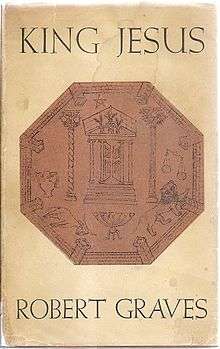King Jesus

King Jesus is a semi-historical novel by Robert Graves, first published in 1946. The novel treats Jesus not as the son of God, but rather as a philosopher with a legitimate claim to the Judaean throne through Herod the Great,[1] as well as the Davidic monarchy; and treats numerous Biblical stories in an unorthodox manner.
The story
Graves wrote the story from the perspective of an official living in the time of Domitian. The novel opens with the statement, "I, AGABUS the Decapolitan, began this work at Alexandria in the ninth year of the Emperor Domitian and completed it at Rome in the thirteenth year of the same."[2] The novel consists primarily of dialogues between the prophets and other people of the story told by the Roman hagiographer. It begins with the reign of Herod before Jesus is born and explains the dynastical, quasi-secular roots of Jesus both from his mother's and his father's side, establishing a temporal and historical right to the throne of Israel. The second part starts with the Nativity and Jesus's youth. Finally, the third part chronicles Jesus's work in adulthood as a prophet, his death on the cross, and his resurrection.
In a "Historical Commentary" published at the end of the book Robert Graves remarks, concerning the book's historical basis, "A detailed commentary written to justify the unorthodox views contained in this book would be two or three times as long as the book itself, and would take years to complete; I beg to be excused the task ...[but]...I undertake to my readers that every important element in my story is based on some tradition, however tenuous, and that I have taken more than ordinary pains to verify my historical background" [3]
Editions
The standard scholarly edition is the volume in the Collected Works of Robert Graves (Carcanet Press), edited by Robert A. Davis.
Later references
Herodias Messiah[4] is a work of non-fiction that presents evidence and arguments in support of the central theory of King Jesus (i.e., that Jesus was the son of Antipater ben Herod and Mariamne bat Antigonus).[5]
Notes
- ↑ St John's College Robert Graves Trust
- ↑ First Sentence
- ↑ King Jesus, 2nd edition (1947), Cassell, p352-353
- ↑ Herodias Messiah: Case for Jesus As Grandson of Herod by Joseph Raymond (Tower Grove Publishing, 2010)
- ↑ However, for Graves, Maria wasn't the daughter of King Antigonus (the last Hasomean king executed by Marc Antony in 37 BCE), but Joaquim, a descendant of David.
External links
| ||||||||||||||||||